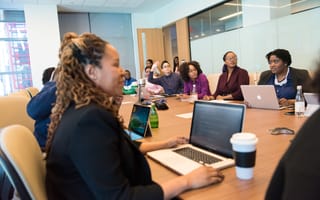Finding the right words to comment on society’s response to societal injustices is incredibly hard to do in just 280 characters, and things don’t necessarily get easier when the character count is increased.
However, as Diankha Linear, Chief Operating Officer at Community notes, “DEI is not the work of splashy announcements or social media posts.”
Certainly, the people who put their time and effort into crafting these posts are doing important work. That said, social media and blog posts are consumed quickly and the material impact they make is fleeting. What is more impactful are the DEI commitments a company makes to its employees and the steps it takes to fulfill those commitments.
Community and Slickdeals are two Los Angeles-based tech companies that are making DEI a priority in 2022. Built In recently spoke with both Linear and Frank Orozco, CTO at Slickdeals, about the DEI goals their companies have for this year and the tangible actions they’re taking to achieve them.
In early 2021, Community launched its “Amplify” program, which so far has provided 39 BIPOC and LGBTQIA+ business owners access to the company’s text messaging platform, used for both connecting with consumers and passing on news of new deals. In addition to this external initiative, the company also has a host of internal goals designed to create a more equitable and inclusive workplace, which Chief Operating Officer Diankha Linear outlined to Built In.
What’s one way you’re committing to improving diversity, equity and inclusion at Community in 2022?
Our mission is to power personal communication at scale over the most trusted messaging platform. This means we have the privilege to power positive change in the community — with words, action and the impact our leaders drive forward. Our DEI goals are the following.
Diversity: We are ensuring that 50 percent of community directors and above are inclusive of diversity in race, gender and that members of the LGBTQIA+ community are represented throughout the company. Equity: We are ensuring that there is gender pay equity throughout the company through an analysis and biannual audit. Inclusion: We host monthly meetings where team members can speak directly, or anonymously, to the senior leadership team.
We have also launched the “Amplify” program, which was created to support small business owners impacted by the pandemic, racial and cultural injustices, and beyond. Through this program, we connect small business owners directly and instantly to their communities, which allows their businesses to be seen and their voices to be amplified. To date, we have supported over 39 Black, AAPI, LGBTQIA+ and Latinx businesses in SoCal.
Our aim is to ensure equal opportunity and an inclusive culture that can serve as a model for other companies moving forward.”
What do you plan to do to fulfill this commitment? And how is leadership supporting these efforts?
As a woman of color on the leadership team, DEI is not the work of splashy announcements or social media posts. It is the hard work of changing our internal culture, recruiting, empowering and mentoring talent, having uncomfortable conversations, improving systems and training our managers and teams. While we are confident in the progress that we have made and will continue to make, we recognize that these changes do not happen overnight. Our aim is to ensure equal opportunity and an inclusive culture that can serve as a model for other companies moving forward.
Why have you decided to make this commitment a priority this year? And how are you holding yourself accountable to it?
We have companywide targets that are focused specifically on diversity, equity and inclusion, to ensure we are held accountable. Additionally, we are ensuring that we are committed to affecting positive change in the community through our Amplify program.

Shopping deals and coupon site Slickdeals is taking both a qualitative and quantitative approach to reaching its DEI commitments in 2022. CTO Frank Orozco, who is also the Slickdeals DEIB Council Chair, said the company is focusing on creating an airtight feedback loop that enables employees to anonymously and directly share their thoughts and is also working to update its workforce demographic data to ensure its initiatives are intersectional.
What’s one way you’re committing to improving diversity, equity and inclusion at Slickdeals in 2022?
At Slickdeals, we are committed to creating a diverse, equitable and inclusive workplace. Like everything else we do in business, DEIB efforts rely on continuous measurement and improvement. While we support a wide variety of initiatives, programs and practices to further our DEIB journey, we are specifically focused on our ability to ensure a quality feedback loop. “Listening” to our employees, through both attributed and anonymous pulse surveys, is essential in ensuring we are taking the right steps.
Our ability to visualize inclusion gaps through intersectionality is a key focus for us. Intersectionality, attributed to Kimberlé Williams Crenshaw, is a framework for understanding how aspects of a person’s social and political identities combine to create different modes of discrimination and privilege.
Our ability to visualize inclusion gaps through intersectionality is a key focus for us.”
What do you plan to do to fulfill this commitment? And how is leadership supporting these efforts?
We have engaged a top-tier DEIB analytics vendor that offers a comprehensive survey, pulse survey and people management platform. Their platform allows us to visualize the demographic data that makes up the intersection of our employees to better tailor our future endeavors. Leadership supported our transition to this platform from both a budgetary and participation perspective, further reinforcing our commitment to a workplace that is diverse, equitable and inclusive. Once this is better understood, we will ensure that future training, financial support and initiatives are invested in key areas that make a tangible difference.
Why have you decided to make this commitment a priority this year? And how are you holding yourself accountable to it?
Without a feedback loop, we cannot be confident that our investments from a time and fiscal perspective are furthering our commitment. Once we launch this platform, we will understand the metrics that matter to our business and allow us to hold ourselves accountable for current metric standings and improvements in these key areas. Our goal is to make these metrics transparent to the company so that improvements are owned by the entire organization rather than just HR. We have learned over time how critical it is to make this distinction when scaling DEIB and the impact these can have on our teams.
We have made these items a priority because we understand that diverse teams are more innovative and capable of solving complex problems. There is clear research that shows inclusive managers create team effectiveness and cohesion. This impacts our overall company reputation, employee engagement and job satisfaction and retention, making these a top priority for our organization.








